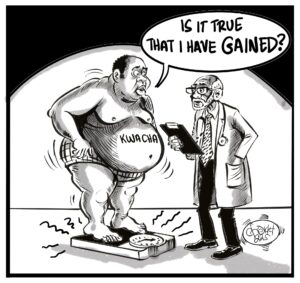TRANSPARENCY International vice chairperson Rueben Lifuka says there is need for law enforcement agencies like the Anti-Corruption Commission (ACC) and the Financial Intelligence Centre (FIC) to collaborate with investigative wings in other countries to ensure that looted assets are traced and recovered.
And Lifuka says the private media played an important role in revealing the corruption that was taking place in the previous administration.
Speaking during the Election Analysis discussion organised by News Diggers! Prime TV and Chapter One Foundation, Thursday, Lifuka said there was need for government to put in place a comprehensive anti-corruption strategy.
“Beyond just making public pronouncements as the President has done, what is important is to demonstrate the specific strategies that government is going to adopt. One strategy which government has intimated already is that they will strengthen the work of the Anti-Corruption Commission, the Drug Enforcement Commission, and the Financial Intelligence Centre. We need a very holistic approach in the fight against corruption. We need to have harmonisation of the laws, we need to look at the systems, part of the systems has to do with asset recovery,” Lifuka said.
“Everyone has been talking about asset recovery and the importance of asset recovery. However, asset recovery requires transboundary initiatives. You need to go into mutual legal assistance in order to recover assets [of] which some of them may be in tax havens. So, for you to do that, you need to have capacity in ACC and collaboration with other law enforcement agencies elsewhere. So, it is a holistic approach. So to simply go for one or two people without dealing with everything else will not help out. Therefore, the longer short of it all is that this government needs to put in place a comprehensive anti- corruption strategy which demonstrates milestones of what they want to achieve.”
Lifuka further said government needed to build an inter-agency entity which would bring all relevant stakeholders together because asset recovery by its nature was not an easy task.
“Asset recovery by its nature is not an easy task. However, government needs to build an inter-agency entity, bringing together the relevant stakeholders, the law enforcement agencies, those that are in the financial sector. The first port of call for asset recovery is asset tracing, you can only recover what you are able to trace. That is where the challenge is. If Assets are within a country they can be traced easily, it is when they are taken outside the country into other jurisdictions. So not only do you need to trace those assets in those countries, you will need to institute legal action in order to recover those assets,” Lifuka said.
“So, if we are serious with asset recovery we also need to deal with the inadequacies of the law in as far as registration of foreign judgments is concerned. The people also have a role to play as well. Some of the assets are in communities where we live and know of these assets which have been obtained through processes of corruption. So, there should be a mechanism where the public can also act as whistle blowers and sufficient protection is given to those whistle blowers.”
When asked if changing the currency could help in asset recovery, Lifuka said doing so could only help in recovering the money which was in the country but not the money saved in tax havens.
“Changing of currency will only deal with the money that is sitting in Zambia. The biggest problem with corruption is when money is moved from Zambia to say a tax haven. Let’s take the British Virgin Islands or Luxembourg or any other of these tax havens, what happens with tax havens? You can incorporate a company in a matter of hours and you can also incorporate a shell company. Because those tax havens are not interested to know the beneficial owner, they are interested in the money that will sit in their economy and work in their economy,” he said.
“So, if I take my money for argument sake, $6 million and I take it to the British Virgin Islands and I incorporate a shell company and I use that shell company to buy real estate in Europe. So, I have houses all over, or I go and buy unique vintage cars in order to layer the money. The challenge is for ACC, FIC and all the others to trace that there is a shell company which has been established by a Zambian and which now owns vintage cars and owns real estate and so many other things. So, you have to trace those assets. So even if you change the currency, you will still have a problem of assets being littered out there, especially tax havens which do not have open registers for beneficial owners.”
Lifuka insisted that asset tracing was a major problem.
“Asset tracing is a major problem. How do you trace assets that have been bought using this matrix of shell companies? You need to have the expertise. As Linda [Kasonde] said, with the Financial Intelligence units now part of a network, you can then start saying in Luxembourg if there is a Financial Intelligence Unit ‘can you help us start tracing these assets’. But it is not easy, it is a big task. Internationally that is a conversation, how do we assist with recovery? Because developing countries with limited resources are not doing sufficiently well in that area,” he said.
Meamwhile, Lifuka said the private media played an important role in revealing corruption that was taking place in the previous government.
“There are a number of factors one could cite for why the elections turned out in the manner that they did. First and foremost, the political impunity of the immediate past regime did send people right into election mode. The silent majority waited for that opportunity to exercise their vote. The erosion of governance or institution of governance, the narrowing of space for civic actors, the corruption levels that we saw, all these are the factors that played into the narrative that we ended up seeing during election time,” said Lifuka.
“Civil society and the media played an important role in highlighting all these concerns but also in bringing to the fore the inadequacies of the leadership that we had. The private media in particular did a sterling job in bringing into the public attention corruption which in my view had assumed industrial level. It was not just ordinary corruption. I think the media will continue to play an important role. One of the roles they have played in the recent past is to bring to the fore a number of scandals.”



















